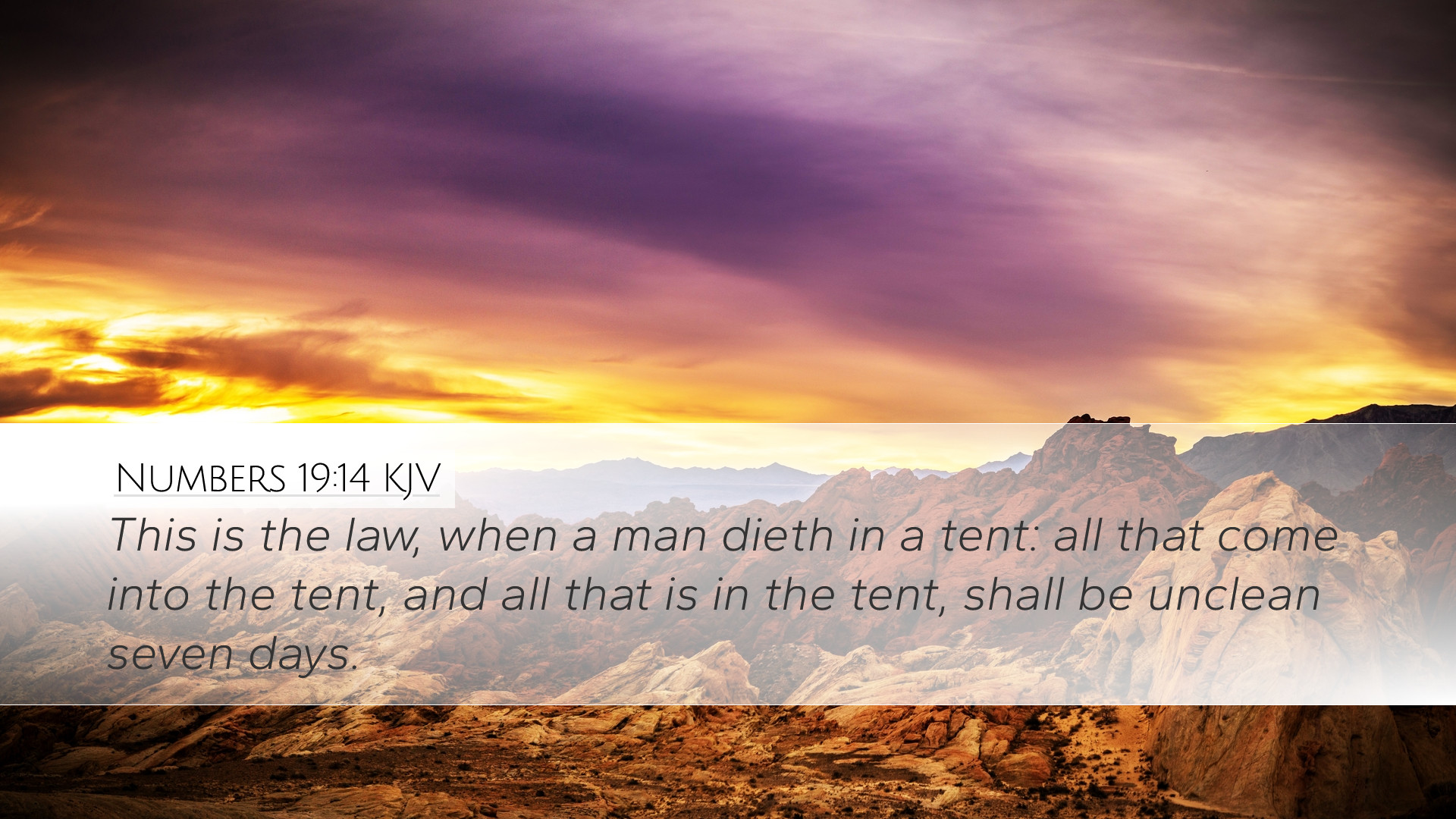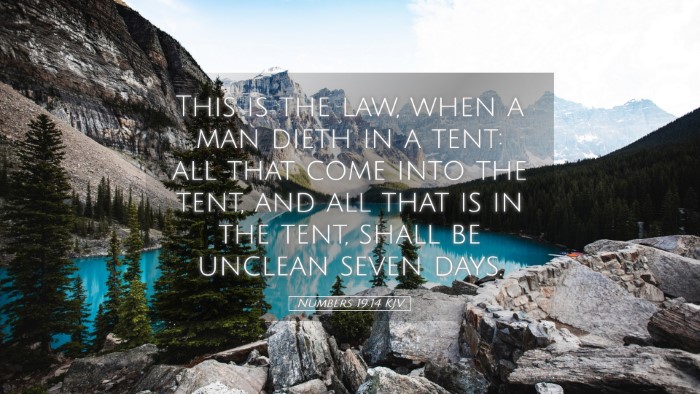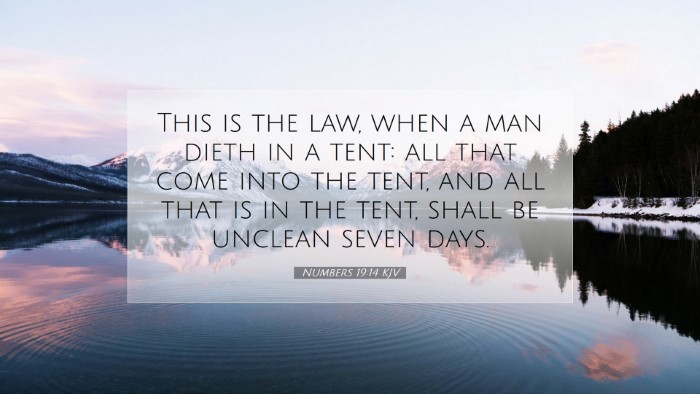Commentary on Numbers 19:14
Verse: Numbers 19:14 - "This is the law for when a man dies in a tent: All who enter the tent and all who are in it shall be unclean for seven days."
Introduction
This passage from Numbers 19 presents the laws of purification in the context of dealing with death and ceremonial uncleanliness. The implications of this scripture are profound, underscoring the significance of purity and the seriousness of death in ancient Israelite culture. The commentaries of Matthew Henry, Albert Barnes, and Adam Clarke elucidate various aspects of this law, providing layered interpretations that resonate with both ancient traditions and contemporary applications.
The Context of Numbers 19
Matthew Henry introduces the chapter as part of the Laws regarding Purification, particularly focusing on the red heifer and its role in atonement and cleansing from the defilement associated with dead bodies. This establishes the foundation that understanding death within Israelite society was tied closely to concepts of holiness and the presence of God.
Albert Barnes emphasizes that the uncleanliness associated with death serves as a reminder of human mortality. In a culture that highly revered life and the divine presence, the reality of death necessitated careful observance of purity laws to maintain communal holiness.
Adam Clarke articulates that the instructions concerning the dead provide profound theological insights into the nature of sin, death, and the necessity for redemption. Clarke notes that death, while a part of human experience, brings with it a spiritual contamination that must be addressed through ritualistic means.
Understanding Uncleanliness
The pronouncement of uncleanliness is pivotal in this verse. The idea that all who enter a dead person’s tent would be rendered unclean illustrates the pervasive nature of death's impact. Commentators suggest the depth of this law transcends physical implications, extending to spiritual and social ramifications as well.
- Matthew Henry: Henry stresses the communal aspects, noting that such laws serve not just individual purity, but the collective sanctity of the nation.
- Albert Barnes: Barnes highlights the separation that death causes, indicating a natural barrier created by the divine order for the sake of maintaining holiness in the camp of Israel.
- Adam Clarke: Clarke points out that the declaration of uncleanly status signifies the need for a cleansing process, illustrating a shadow of the ultimate purification through Christ.
Duration of Uncleanliness
The specified period of seven days is significant in biblical terms, often associated with completeness and divine cycles. The seven-day period for purification underscores the seriousness of dealing with death and the subsequent need for restoration to a state of cleanliness.
- Henry: He correlates the seven days to the cycle of renewal, symbolizing a time to reflect on mortality and seek after spiritual restoration.
- Barnes: Barnes notes that this period is a time for introspection before coming back into the presence of God, highlighting the concept of preparation in approaching holiness.
- Clarke: Clarke discusses this time as illustrative of the ultimate work required for atonement, mirroring the careful preparation needed in our spiritual lives.
Theological Implications
The implications of Numbers 19:14 extend into the New Testament, where the concepts of ceremonial law and purity are fulfilled in Christ. Each commentator connects this Old Testament directive to modern themes of sin, redemption, and the hope for resurrection.
- Henry: He draws parallels to the New Testament narrative, where Christ’s death and resurrection overcome the finality of death, offering believers a new identity and purification.
- Barnes: Barnes points to the transformative power of Christ, who navigates through uncleanliness yet maintains purity, highlighting grace for humanity's condition.
- Clarke: He emphasizes that the laws are pointers towards grace, where acknowledgment of sin leads to cleansing through faith in Christ.
Applications for Today
For pastors, students, theologians, and Bible scholars, Numbers 19:14 invites reflection upon the seriousness of sin and the necessity of purity in one's spiritual walk. It also suggests practical applications in understanding the ways death still impacts communities, calling for compassionate responses to loss while recognizing the ultimate hope found in Christ.
- Pastoral Care: Address the realities of grief and mortality within congregations, providing support while teaching about the hope of resurrection.
- Theological Reflection: Encourage deeper study into how Old Testament laws inform New Testament theology, particularly surrounding life, death, and resurrection themes.
- Personal Purity: Challenge individuals to evaluate their lives in terms of spiritual cleanliness and the continual need for Christ's atonement.
Conclusion
In conclusion, Numbers 19:14 serves as a vital reminder of the gravity surrounding death and the laws governing purity in Israel's camp. Through the insights of Matthew Henry, Albert Barnes, and Adam Clarke, we gain a deeper understanding of its implications, both in the context it was written and in our contemporary lives. Such a study ultimately leads us to the heart of the Gospel, where Jesus Christ stands as the fulfillment of all ritual laws and the source of our spiritual cleansing and hope.


